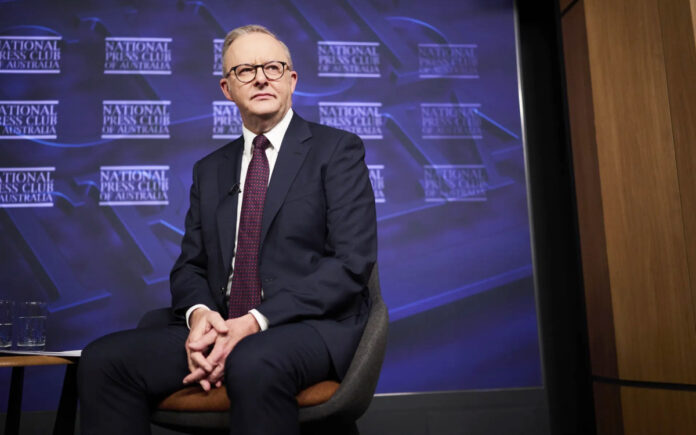Canberra: Australian Prime Minister Anthony Albanese, leader of the centre-left Labor Party, is campaigning for a second term, presenting himself as a steady hand in uncertain global times. His leadership, marked by a blend of pragmatism and social conscience, has navigated economic turbulence and geopolitical shifts, while emphasizing national stability amid comparisons between opposition leader Peter Dutton and former U.S. President Donald Trump.
Albanese has warned voters that electing the conservative Liberal-National coalition, led by Dutton, would bring “chaos” to Australia.
“In an uncertain world, a vote for Labor means you can be certain of a government that will stand up for Australia, not copy from overseas,” Albanese said at the National Press Club in the final stretch of the campaign.
Recent polls show Labor regaining momentum over the conservative bloc, as comparisons between Dutton and Trump appear to be pushing risk-averse voters toward the incumbent. Albanese’s criticism of Trump-era tariffs and his refusal to compromise on domestic priorities—like lowering drug prices and child protection laws on social media—have reinforced his message of independence and national interest.
“He gave the message, ‘Don’t worry Australia’,” noted Simon Jackman, an independent political analyst.
Throughout his term, Albanese deepened Australia’s security alliance with the United States through the AUKUS nuclear submarine pact, worth A$368 billion ($232 billion), and revived diplomatic dialogue with China following a period of tense trade relations.
“China is the major power in the region, which is seeking to increase its influence. But the relationship is complex as well, because China is our major trading partner,” he said in a televised debate when asked whether China poses a threat.
Albanese emphasized Australia’s approach as one of balanced diplomacy and increased defense investment.
From Working-Class Roots to National Leadership
At 62, Anthony Albanese is known for his grounded persona and commitment to social justice, shaped by a modest upbringing. Raised in public housing by a single mother on a disability pension, Albanese’s early life instilled a sense of determination that continues to shape his political identity.
“There is a lovely softness to him. I have seen him cry,” said Linda Burney, a close friend and Labor parliamentarian.
“He has just been a rock in my life.”
Burney credits Albanese for encouraging her political journey, which saw her become the first Indigenous Australian elected to the New South Wales Parliament and later the federal Minister for Indigenous Australians.
“Kindness isn’t weakness… I’ve been capable of making tough decisions,” Albanese said during a debate, underlining his leadership approach.
His 2022 victory marked the end of nine years of conservative rule, with the Labor campaign heavily focusing on his working-class credentials. The first in his family to attend university, Albanese—widely known as “Albo”—studied economics and was active in student politics.
However, by 2024, headlines turned to his A$4 million ($2.5 million) purchase of a beachfront home in New South Wales, drawing attention in the midst of a national housing affordability crisis—one of the key issues in the 2025 election.
Despite global inflation sparked by the Ukraine war putting pressure on household budgets, Albanese delivered on key pledges, such as increasing funding for childcare and raising wages for low-income workers.
“Just crucial in terms of seeing Australia through very difficult times,” said Burney, referring to relief measures like energy bill rebates.
Looking ahead, Labor’s platform includes tax cuts, expanded homeownership support for young Australians, and a proposed A$8.5 billion investment in Medicare.
Also Read | U.S. Urges India and Pakistan to Cooperate in Easing Tensions After Kashmir Attack
Strategic Diplomacy and Indigenous Rights
Albanese’s interests often intersect with politics and diplomacy—evident in his passion for the National Rugby League, which he once discussed with Trump during a 2025 phone call. His government pledged A$600 million ($378 million) to help Papua New Guinea establish a national rugby league team, contingent on the island nation rejecting Beijing’s security overtures.
PNG Prime Minister James Marape responded with appreciation:
“I would forever appreciate” Albanese’s support.
One of the most defining—and challenging—chapters of Albanese’s tenure has been his push for constitutional recognition of Indigenous Australians. Despite strong personal and political investment, the 2023 referendum failed, with over 60% of voters rejecting the proposal.
“That was an enormously damaging episode to the government,” noted historian Frank Bongiorno of the Australian National University.
Albanese’s political roots can be traced back to his early work under Bob Hawke—Labor’s longest-serving prime minister. Hawke’s legacy of universal healthcare and his attempt at Indigenous treaty-making continue to inform Albanese’s policy agenda.
Also Read | Wellington Hit by Decade’s Strongest Winds as Storms Batter New Zealand
With polls indicating Labor may need support from independents to form government, Albanese’s experience in navigating minority rule—particularly during his time as Leader of the House under Julia Gillard from 2010 to 2013—could prove decisive.
“If it is a hung parliament, his leadership, his negotiation skills and his experience in the political arena is going to be absolutely critical,” said Burney.



